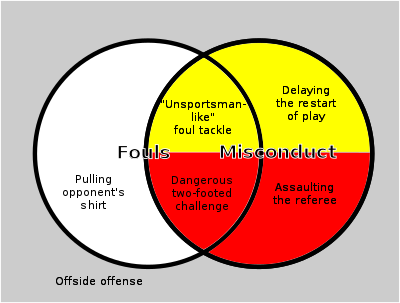
In the sport of association football, fouls and misconduct are acts committed by players which are deemed by the referee to be unfair and are subsequently penalised. An offence may be a foul, misconduct or both depending on the nature of the offence and the circumstances in which it occurs. Fouls and misconduct are addressed in Law 12 of the Laws of the Game. A foul is an unfair act by a player, deemed by the referee to contravene the game's laws, that interferes with the active play of the match. Fouls are punished by the award of a free kick (possibly a penalty kick) to the opposing team. A list of specific offences that can be fouls are detailed in Law 12 of the Laws of the Game (other infractions, such as technical infractions at restarts, are not deemed to be fouls); these mostly concern unnecessarily aggressive physical play and the offence of handling the ball. An infringement is classified as a foul when it meets all the following conditions:
- It is committed by a player (not a substitute);
- It occurs on the field of play;
- It occurs while the ball is in play;
- It is committed against an opponent (for fouls concerning contact or conduct between players).
For example, a player striking the referee or a teammate is not a foul, but is misconduct.[1]
Misconduct is any conduct by a player that is deemed by the referee to warrant a disciplinary sanction (caution or dismissal). Misconduct may include acts which are, additionally, fouls. Unlike fouls, misconduct may occur at any time, including when the ball is out of play, during half-time and before and after the game, and both players and substitutes may be sanctioned for misconduct.
Misconduct will result in the player either receiving a caution (indicated by a yellow card) or being dismissed ("sent off") from the field (indicated by a red card).[1]: 38 A dismissed player cannot be replaced; their team is required to play the remainder of the game with one fewer player. A second caution results in the player being dismissed. The referee has considerable discretion in applying the Laws; in particular, the offence of unsporting behaviour may be used to deal with most events that violate the spirit of the game, even if they are not listed as specific offences.[1]: 123
The system of cautioning and dismissal has existed in the Laws since 1881.[2] Association football was the first sport to introduce penalty cards to indicate the referee's decisions; a practice since adopted by many other sports. The first major use of the cards was in the 1970 FIFA World Cup, but they were not made mandatory at all levels until 1992.[3]
- ^ a b c International Football Association Board. Laws of the Game (PDF) (2014/2015 ed.). Zürich: FIFA. Archived from the original (PDF) on 1 September 2014. Retrieved 20 November 2014.
- ^ – via Wikisource.
- ^ "Minutes of the Annual General Meeting" (PDF). Soccer South Bay Referee Association. International Football Association Board. 30 May 1992. Archived from the original (PDF) on 5 May 2015. Retrieved 7 January 2015.